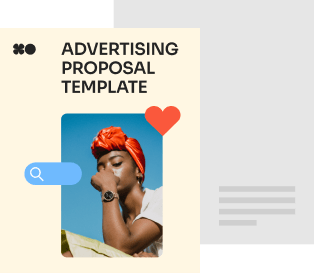What is a proposal template?
In proposal writing, a proposal template is a document that already contains a pre-arranged layout and any preliminary information required to write a proposal.
This can include boilerplate details like the name and address of the institution, the current school principal, or even the contact information of the proposal writer and related project stakeholders.
The template might also include formatted headers, logos and letterheads, and even a basic outline commonly used when structuring proposals.
The purpose of the proposal template is to contain any standardized information within the proposal in order to save time, improve grammatical accuracy, and ensure that all basic details are automatically covered.
Why do I need templates for my school or education program?
Proposal templates are valuable for education projects and programs in a few separate ways.
First, proposal templates are useful when trying to acquire grant funding via a grant application or project proposal. In this scenario, templates can help to accelerate the application or request process, potentially making your team more competitive through efficiency during proposal creation.
Second, templates can help you make the best use of any funding that you have. For example, a program proposal template can help you ensure that you’ve covered all of the basic information that you need to include regarding your proposed educational program. While you’ll still need to modify the template to suit your use case, you can stock the template with “must-have” inventory items that a program might need.
Lastly, templates can be used in the request for proposal (RFP) process to quickly compile and send your specifications to suppliers when your school needs to solicit partners as part of a competitive process.
When external vendors are essential to acquire the supplies you need to complete your initiative, project and grant proposal templates can go a long way to ensure a fast and seamless process.
What templates do I need?
You may need a variety of different proposals in order to cover the needs of your organization, existing staffing, and a variety of other factors.
For example, you may have an IT department capable of maintaining school computers that lacks the information required to handle an onboard security system. In a scenario like that, you might need a service contract to outsource those services because your team members lack the bandwidth to handle those responsibilities.
Most educational institutions need three or four key templates.
Course proposal templates
Generally, course proposals are designed to request funding or approval for a specific course that an educator would like to teach.
The problem is that course proposals can vary based on requirements and departmental expectations. Administrators can streamline this process and drastically reduce confusion by creating a template that includes all relevant guidelines so that instructors have a guide when creating their own course proposals.
Grants are key components when it comes to acquiring funding for major projects and initiatives within your organization. Government grants follow specific guidelines and can have their own competitive process, while private grants may require an entirely different set of directions.
Templates can help when multiple grants follow a similar process — such as at the state or federal level — or when your team is applying for multiple grants from the same foundation or partner organization.
Program proposal templates
Acquiring funding for school programs is a great way to expand the kind of education that your institution can offer. Extracurricular programs can enhance student life while core academic programs might transform the way your department teaches a specific subject.
Unfortunately, these programs often require some kind of outside funding and supplies. A program proposal template may be essential to ensure that your departments are covering all their bases.
Build EDU templates faster with PandaDoc!
Without a doubt, creating documentation that helps your department gain funding or start new programs can be complex and difficult to build.
But it doesn’t have to be that way. PandaDoc gives your team all the tools you’ll need in order to build and design the perfect project proposal template.
Our document editor is equipped with a variety of tools designed to help you build documentation quickly and easily before saving it into templates that are easy for the rest of the team to recycle and reuse.
Come learn how PandaDoc can transform the way you build documents.
Sign up for a free 14-day trial to get started.















